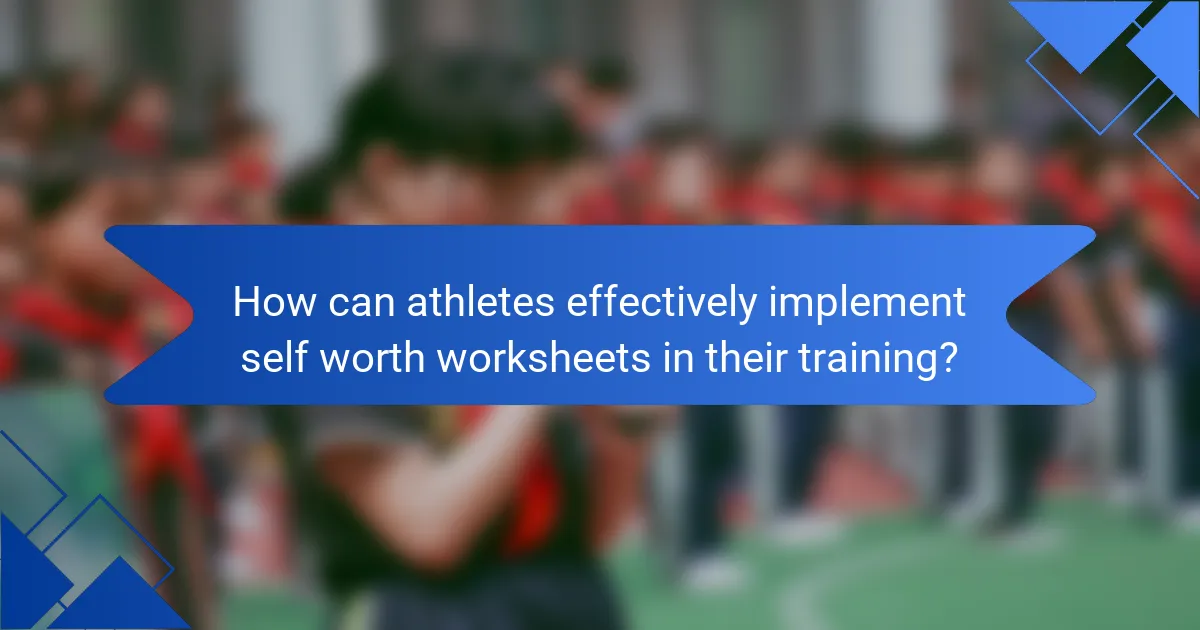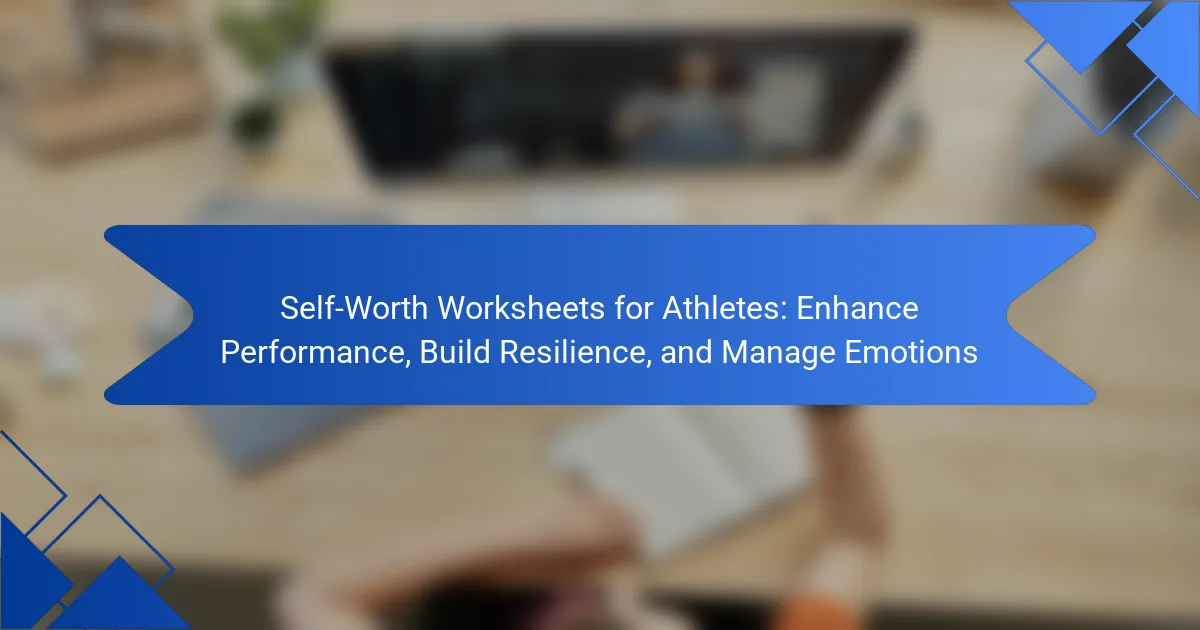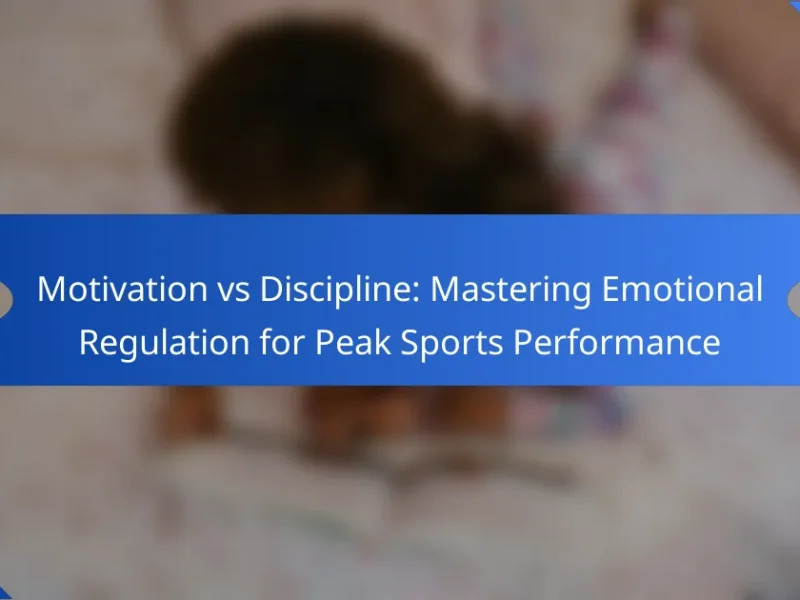Self Worth Worksheets for Athletes enhance performance, build resilience, and manage emotions. These tools promote self-reflection and goal-setting, fostering a positive self-image. They include exercises for self-awareness, emotional regulation, and tracking progress. Incorporating expert insights and peer feedback further amplifies their effectiveness in overcoming challenges.

What are Self Worth Worksheets for Athletes?
Self Worth Worksheets for Athletes help enhance performance, build resilience, and manage emotions effectively. These worksheets guide athletes in self-reflection, goal-setting, and developing a positive self-image. They often include exercises that promote self-awareness, helping athletes identify strengths and areas for improvement. As a result, athletes can cultivate a growth mindset, which is crucial for overcoming challenges and setbacks in their sports journey.
How do they enhance performance?
Self-worth worksheets enhance performance by building confidence, fostering resilience, and improving emotional regulation. These tools help athletes identify strengths and set realistic goals, which boosts motivation and focus during training and competition. Regular use can lead to a positive mindset, reducing anxiety and enhancing overall performance metrics.
In what ways do they build resilience?
Self worth worksheets for athletes build resilience by enhancing self-awareness, promoting positive self-talk, and encouraging goal-setting. These worksheets help athletes identify strengths and weaknesses, fostering a growth mindset. As a result, they develop coping strategies for setbacks, improving emotional regulation during competition. Regular use can lead to increased confidence and better performance under pressure.
How do they help manage emotions?
Self-worth worksheets help athletes manage emotions by fostering self-reflection and promoting positive self-talk. These tools encourage athletes to identify and challenge negative beliefs, enhancing emotional resilience. Regular use can lead to improved emotional regulation, enabling athletes to cope better with stress and setbacks. This proactive approach ultimately enhances performance by aligning mental and emotional states with athletic goals.

What are the universal benefits of using self worth worksheets?
Self worth worksheets provide athletes with essential benefits that enhance performance, build resilience, and manage emotions. These worksheets foster self-awareness, helping athletes identify strengths and areas for improvement. They encourage positive self-talk, which boosts confidence and reduces anxiety. Regular use promotes emotional regulation, enabling athletes to cope with stress and setbacks effectively. Additionally, self worth worksheets can improve focus and motivation by setting clear personal goals. Ultimately, these tools support athletes in achieving both personal and competitive success.
How do they improve mental clarity?
Self-worth worksheets improve mental clarity by helping athletes identify and challenge negative thoughts. They promote self-reflection, enabling athletes to recognize their strengths and weaknesses. This process boosts confidence, reduces anxiety, and enhances focus during performance. By fostering a positive self-image, athletes can achieve greater mental clarity and improved decision-making on and off the field.
What role do they play in goal setting?
Self-worth worksheets play a crucial role in goal setting for athletes by enhancing self-awareness and motivation. These tools help athletes identify personal strengths and areas for improvement, fostering a growth mindset. By setting specific, measurable, achievable, relevant, and time-bound (SMART) goals, athletes can track progress and build resilience. Additionally, self-worth worksheets encourage emotional management, allowing athletes to navigate challenges effectively. This holistic approach ultimately leads to improved performance and personal development.
How can they foster a positive mindset?
Self-worth worksheets can foster a positive mindset by encouraging self-reflection and goal-setting. These worksheets help athletes identify strengths and areas for improvement, enhancing self-awareness. They promote resilience by allowing athletes to track progress and manage emotions effectively. Regular use can lead to increased confidence and a more positive outlook on performance.

What unique features differentiate self worth worksheets?
Self worth worksheets for athletes are distinguished by their focus on performance enhancement, emotional management, and resilience building. Unique features include tailored exercises that address the psychological challenges athletes face, such as self-doubt and pressure. These worksheets often incorporate visualization techniques and goal-setting strategies, which are essential for fostering a growth mindset. Additionally, they provide metrics for self-assessment, allowing athletes to track their emotional progress and performance over time.
How do personalized worksheets cater to individual athlete needs?
Personalized worksheets cater to individual athlete needs by addressing specific emotional and performance challenges. These worksheets enhance self-worth, allowing athletes to identify strengths and areas for improvement. Tailored content encourages reflection and goal setting, fostering resilience. Unique attributes such as personalized feedback and targeted exercises ensure relevance, maximizing effectiveness. As a result, athletes experience improved mental clarity and emotional management, leading to better overall performance.
What innovative techniques are incorporated into these worksheets?
Self Worth Worksheets for Athletes incorporate innovative techniques such as guided visualization, cognitive restructuring, and self-reflection prompts. These methods enhance self-awareness and emotional regulation, fostering resilience. Guided visualization assists athletes in picturing successful outcomes, while cognitive restructuring helps challenge negative beliefs. Self-reflection prompts encourage athletes to analyze their experiences, reinforcing personal growth and self-worth.

What rare attributes can enhance the effectiveness of self worth worksheets?
Incorporating rare attributes into self-worth worksheets can significantly enhance their effectiveness for athletes. Unique perspectives, such as personalized feedback loops, allow athletes to reflect on their individual journeys. Integrating mindfulness practices can also foster emotional regulation, promoting resilience. Another rare attribute is the inclusion of peer support elements, encouraging shared experiences that validate self-worth. Lastly, gamification techniques can motivate athletes by making the worksheets more engaging and rewarding.
How can integrating feedback from coaches improve outcomes?
Integrating feedback from coaches significantly enhances athletes’ self-worth and performance. Constructive criticism fosters resilience, allowing athletes to manage emotions effectively. Regular feedback sessions create a supportive environment, encouraging self-reflection and growth. This process not only boosts confidence but also leads to improved outcomes in training and competition.
What is the impact of peer support on worksheet effectiveness?
Peer support significantly enhances the effectiveness of self-worth worksheets for athletes. It fosters a collaborative environment where athletes share experiences, leading to increased motivation and accountability. Research indicates that peer support can improve emotional resilience, making athletes more likely to engage with worksheets. This interaction builds trust and encourages honest reflection, which is crucial for personal growth. Ultimately, athletes who utilize peer support while working on these worksheets report higher satisfaction and better performance outcomes.

How can athletes effectively implement self worth worksheets in their training?
Athletes can effectively implement self-worth worksheets by integrating them into their daily training routines. These worksheets help athletes identify personal strengths, set realistic goals, and track progress, fostering a positive self-image and resilience.
First, athletes should dedicate time each week to complete the worksheets, reflecting on their achievements and areas for improvement. This consistent practice reinforces self-awareness and emotional management. Second, athletes can use the worksheets to establish specific performance goals, aligning their training efforts with their self-worth, which enhances motivation and focus.
Additionally, incorporating feedback from coaches or peers while filling out the worksheets can provide valuable insights. This collaborative approach not only builds trust but also strengthens the athlete’s support network. Lastly, reviewing and updating the worksheets regularly ensures that athletes remain aligned with their evolving goals and self-perception, ultimately enhancing their performance and mental well-being.
What are the best practices for daily usage?
To effectively use self-worth worksheets daily, integrate them into your training routine. Start each day by reflecting on your achievements and setting positive intentions. Utilize the worksheets to identify strengths, manage emotions, and build resilience, focusing on one attribute at a time. Consistency is key; aim for at least 10 minutes of worksheet engagement daily. Track your progress to reinforce growth and adapt your strategies as needed.
How should athletes track their progress?
Athletes should track their progress using self-worth worksheets to enhance performance and manage emotions. These worksheets allow athletes to set clear goals, reflect on achievements, and identify areas for improvement. Regularly updating these worksheets fosters resilience and self-awareness, crucial for long-term success. Incorporating metrics such as personal bests and emotional well-being assessments can provide valuable insights into performance trends.
What common mistakes should athletes avoid?
Athletes should avoid underestimating their mental health, neglecting recovery, and setting unrealistic goals. These mistakes can hinder performance and resilience. Prioritizing emotional management through self-worth worksheets can enhance focus and motivation. Additionally, overlooking the importance of a support system may lead to isolation and burnout.
How can athletes optimize their emotional regulation using these tools?
Athletes can optimize emotional regulation by utilizing self-worth worksheets to identify triggers and reinforce positive self-talk. These worksheets enhance performance by fostering resilience and providing structured reflection. Regular use can lead to improved emotional management, reducing anxiety and enhancing focus during competition. By tracking emotions and responses, athletes can develop personalized strategies for regulation, ultimately supporting consistent performance.

What expert insights can enhance the use of self worth worksheets?
Utilizing expert insights can significantly enhance the effectiveness of self-worth worksheets for athletes. Focus on integrating cognitive behavioral techniques to address negative self-talk, which can undermine confidence. Additionally, incorporating goal-setting strategies helps athletes track progress and celebrate achievements, reinforcing their self-worth. Regular reflection on emotional responses to performance can build resilience, allowing athletes to manage setbacks constructively. Lastly, peer feedback can provide valuable perspectives, fostering a supportive environment that enhances the overall impact of these worksheets.
What strategies do sports psychologists recommend?
Sports psychologists recommend strategies such as self-worth worksheets to enhance performance, build resilience, and manage emotions effectively. These worksheets help athletes identify their strengths, set realistic goals, and reflect on their achievements. Incorporating mindfulness practices is another key strategy, as it promotes focus and emotional regulation. Additionally, visualization techniques are suggested to improve confidence and mental preparedness. Regular feedback and positive reinforcement further encourage growth and motivation.
How can athletes leverage their worksheets for long-term success?
Athletes can leverage their worksheets for long-term success by using them to track progress, set goals, and reflect on performance. These worksheets enhance self-worth, allowing athletes to build resilience and manage emotions effectively. Regularly updating worksheets fosters accountability and motivates continuous improvement. Furthermore, incorporating unique attributes like personalized feedback can deepen self-awareness and promote mental strength, which are crucial for sustained athletic performance.


